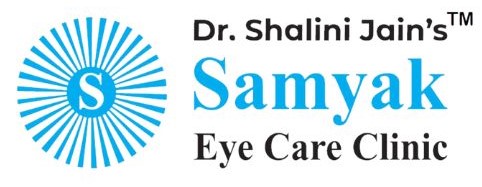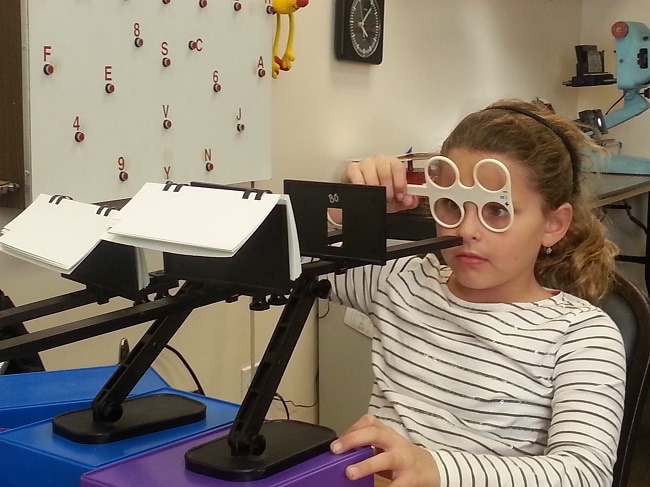Myopia commonly known as nearsightedness or shortsightedness is the inability to see far objects or images clearly. A person with Myopia will find it difficult to see road signs, the television or a clock on the wall. While both adults and children are at risk of myopia development and progression, 40% of the people affected are under the age of 17. Myopia is the condition in which the axial length of the eye grows too long or the cornea or eye lens becomes too curved relative to the eyeball length. Instead of focusing on images directly on the retina, a myopic person will focus on images in front of the retina which can result in blurry distant vision.
Myopia can be corrected in different methods like using corrective eyeglasses or contact lenses that eye doctors denote by a negative sign such as -1.00 or -2.25 in their optical prescription. Vision therapy is effective and appropriate for myopia that occurs due to a lack of eye focusing skills. Vision therapy mostly involves a personalized treatment process that improves focusing abilities by training the visual system, including the eye-brain connection to function more efficiently. Vision therapy helps reduce the risk of developing progressive myopia by improving focusing skills.
Vision therapy is best known as a process to help children and adults with eye turn, lazy eye or learning difficulties. Most parents are still unfamiliar with the effectiveness of vision therapy in preventing, reducing or slowing down the progression of myopia in children. While there isn’t yet any cure found for Myopia, vision therapy is recommended by eye doctors as it may target certain factors that contribute to the progression of Myopia.
How does Vision Therapy Work?
Vision therapy is an evidence-based myopia treatment process that involves a set of non-invasive visual exercises personalised to your unique needs. The eye specialist may use balance beams, computerized aids, specialized prisms or filters and other therapeutic tools to train the coordination between the brain and eyes. Vision therapy focuses on developing visual skills like eye teaming, eye tracking, convergence, accommodation, visual memory, visual processing, depth perception and focusing. The doctor may also suggest doing eye exercises for double vision and other daily visual exercises that involve an at-home component. Vision therapy is regarded as an effective program to improve the learning, reading, sports performance and overall academic performance of children.
How Does Vision Therapy Relate To Myopia?
Myopia cannot be fully reversed with vision therapy, but it can be beneficial to some extent. Eye specialists report that vision therapy has helped myopia patients show significant improvements in their condition during or after the program. The strengthened visual accommodation skill may be a reason for the improvement. The visual accommodation enables the eyes to maintain a clear focus on objects. Poor visual skills such as accommodation lag could be a risk factor associated with the onset and progression of myopia.
Accommodative spasm is a condition in which the eyes lock their focus on a near object thus making it difficult to shift focus to see distant objects. As this condition is related to the focusing mechanism of the lens rather than the elongation of the eye, it is considered false myopia. Vision therapy may be an effective treatment for accommodative spasms as it is the only cause for distance vision getting blurry. A successful vision therapy treatment may avoid the need for wearing a prescription for vision correction.
Do You Require Vision Therapy?
One of the important eye health tips is to regularly consult a qualified eye specialist who is experienced in providing vision therapy for different visual disorders. They will be able to identify whether vision therapy is required for you or your children and can also prescribe the necessary treatments that give optimal results for the condition.
A personalized vision therapy program can be helpful for children and adults with visual dysfunction like headaches, nausea, dizziness, attention deficits, anxiety, behavioural and learning problems and difficulties in coordination. You should schedule an appointment with the eye specialist for a functional visual assessment to know whether vision therapy can be helpful for you or your child.
Closing Thoughts
Research on the effectiveness of vision therapy is ongoing but in some cases, it may be helpful in improving eye conditions like blurred vision. A combination of vision therapy exercises along with eye exams and myopia management can help regain clear vision while reducing the risk of developing ocular diseases. Dr Shalini Jain’s Samyak Eye Care Clinic is a leading hospital for treating myopia in Ghaziabad. We determine whether you are an ideal candidate for vision therapy by performing a comprehensive eye exam. Vision therapy is also a reliable treatment program for people who have developmental delays or brain injuries. Schedule an appointment with us today to know more about vision therapy. We determine whether you are an ideal candidate for vision therapy by performing a comprehensive eye exam. Vision therapy is also a reliable treatment program for people who have developmental delays or brain injuries. Schedule an appointment with us today to know more about vision therapy.


